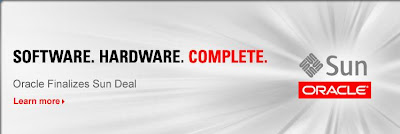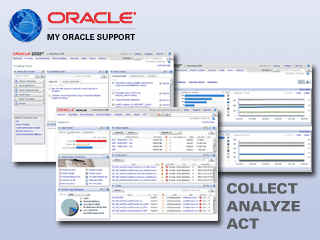 Editor's Note: This Virtual Classroom Schedule was updated on February 24th with the most current dates and times.
Editor's Note: This Virtual Classroom Schedule was updated on February 24th with the most current dates and times.
If it seems like our Virtual Classroom campaigns have been on a continuous loop, then you've definitely been paying attention. Starting with the Oracle Business Intelligence and Oracle GoldenGate webcasts back in December, and now on to the "Upgrading to 11g" series, indeed, our presenters have been busy.
But let me be clear, this frequency boils down to a simple matter of supply and demand. Customers demand (okay, they actually "request nicely"), and we supply. Done and done.
At any rate, here is the latest schedule of free online training courses, provided only to our valued, existing Oracle customers. If you would like to attend please do let me know and I'll send you the appropriate web and dial-in coordinates.
March 9th 1pm EST – Upgrading to Database 11g – new Features & Functionality: This will be a 60 minute high level presentation to cover the following topics:
>> Real Application Testing
>> Manageability
>> Total Recal
>> SQL Plan Management
>> Security
>> Integrated Components
>> 11g for Storage Administrators
>> New Caching and Connection Pooling
>> Advanced Compression
March 11th 11am EST - Application Performance Management Overview: This will be a 60 minute high level presentation to introduce all the new products we have in our Systems & Application Management product line:
>> Application Testing Suite. Application Testing tools including load testing & functional testing as well as the test quality manager for upgrades, patches, etc. There are also EBS, Siebel, Web Services accelerators for this product allowing for usage of hundreds of pre-built forms in order to cut down on the testing time for each individual application test
>> Real User Experience Insight. End to End holistic tool that allows IT or the business to have a direct view into what exactly end users are doing within the application to pinpoint issues. Accelerators for EBS, Siebel, PeopleSoft, and JDE Enterprise One are available to provide hundreds of prebuilt forms and cut down on implementation and deployment time
>> Application Management Packs for EBS, PeopleSoft, Siebel, and JDE Enterprise One
March 22th 11am EST – Application Performance Management for E-Business Suite: This will be a 90 minute deep dive session – 45-60 minutes spent in presentation and 30-45 minutes spent in demo mode.
>> Application Testing for EBS. Including Load Testing, Functional Testing, and Test Manager specific to EBS.
>> Real User Experience Insight for EBS. End to end passive monitoring tool allowing to view the end user experience and help to diagnose issues from the application tier, through the network, application and web servers, and down through to the database.
>> Application Management Packs for EBS. Through the management pack, you can proactively monitor the health of all Oracle E-Business Suite application components, the hosts that they run on, and the key business processes that they support. If a potential problem is spotted, you may use Oracle Enterprise Manager’s diagnostic tools to identify the root cause and fix it quickly. In addition, Oracle Enterprise Manager helps you visualize the impact of application performance in the context of business impacts, so that you can apply resources in a way that is aligned with your business priorities.
>> Application Change Management Pack for EBS. Consisting of three components:
Customization Manager. Provides a toolset of infrastructure to package and redeploy custom applications, reports, and extensions. Customization Manager bundles the respective files into an AD-Compliant Patch and then uses standard EBS tools to deploy those products into downstream instances.
Patch Manager. Eliminates many of the manual, redundant tasks associated with existing patch application practices. Key features of the product include a guided interview process, the ability to deploy custom patches as well as Oracle patches, the ability to apply the patch simultaneously on multiple targets, and a central console to manage patches for all instances.
Setup Manager. Provides substantial enhancements to an existing EBS tool, Oracle iSetup. Key enhancements include the ability to group individual extracts into a project, and then deploy that project to multiple instances simultaneously. In addition, the project concepts enforces any dependencies that might exist between individual extracts. This all results in a massive reduction in time and effort investments associated with the management of configuration information, as well as considerable improvement in consistency and accuracy.
March 23rd 11am EST – Application Testing Suite: This will be a 90 minute deep dive session including 45-60 minutes of presentation followed by 30-45 minutes of demo and Q&A.
>> Application Testing tools. Including Load Testing, Functional Testing, as well as the test quality manager for upgrades, patches, etc. There are also EBS, Siebel, Web Services accelerators for this product allowing for usage of hundreds of pre-built forms in order to cut down on the testing time for each individual application test.
March 23rd 1pm EST – Database Security
March 24th 11am EST – Application Management Pack for Siebel: This will be a 90 minute deep dive session – 45-60 minutes spent in presentation and 30-45 minutes spent in demo mode.
>> Application Testing for Siebel. Including Load Testing, Functional Testing, and Test Manager specific to EBS
>> Real User Experience Insight for Siebel.
>> Application Management Pack for Siebel. Through the management pack, you can proactively monitor the health of all Oracle Siebel application components, the hosts that they run on, and the key business processes that they support. If a potential problem is spotted, you may use Oracle Enterprise Manager’s diagnostic tools to identify the root cause and fix it quickly. In addition, Oracle Enterprise Manager helps you visualize the impact of application performance in the context of business impacts, so that you can apply resources in a way that is aligned with your business priorities.
March 24th 1pm EST – Database Testing Deep Dive: Real Application Testing (RAT) – This will be a 90 minute session to include a 45-60 minute presentation followed by 30-45 minute demo and Q&A session. Recently, Oracle has taken a greater focus on Application Performance Management. Based on our research:
>> Application performance problems predominately link back to the SQL Queries in the database.
>> The traditional ways of testing databases has limited companies to simulate testing of only 15% of their database.
>> Oracle has a solution that is designed to test 100% of the SQL statements automatically in a production environment.
>> Whether you are on Version 9, 10, or 11 of Oracle Databases, Real Application Test can help improve the testing cycle of database upgrades.
March 25th 11am EST – Real User Experience Insight: This will be a 90 minute deep dive session with 45-60 minutes of presentation and 30-45 minutes spent in demo and Q&A.
>> This is an end-to-end holistic tool that allows IT or the business to have a direct view into what exactly end users are doing within the application to pinpoint issues, from the application layer down through the network to the database/server layers to help pinpoint the issue.
>> A good example of this is online retailers who lose revenue each year to their competitors due to issues in the online transactions that are not relayed to the vendor or supplier. The vendors or suppliers of the website are never aware of the technical issues causing lost revenue as 99% of the US population does not call in to explain the issues to the IT organizations.
>> Accelerators for EBS, Siebel, PeopleSoft, and JDE Enterprise One are available to provide hundreds of prebuilt forms and cut down on implementation and deployment time.
March 25th 1pm EST – Information Lifecycle Management: This will be a 90 minute deep dive session with 45-60 minutes of presentation and 30-45 minutes spent in demo and Q&A.
>> Partitioning. Describes benefits of Oracle Partitioning, which stretch beyond scalability into availability, manageability and performance.
>> Advanced Compression. An option introduced in Oracle Database 11g Enterprise Edition, offers a comprehensive set of compression capabilities to help organizations reduce costs, while maintaining or improving performance. It significantly reduces the storage footprint of databases through compression of structured data (numbers, characters) as well as unstructured data (documents, spreadsheets, XML and other files). It provides enhanced compression for database backups and also includes network compression capabilities for faster synchronization of standby databases.
>> Active Data Guard. Provides the management, monitoring, and automation software to create and maintain one or more synchronized replicas (standby databases) of a production database (primary database). An Active Data Guard standby database is an exact copy of the primary that is open read-only while it continuously applies changes transmitted by the primary database. An active standby can offload ad-hoc queries, reporting, and fast incremental backups from the primary database, improving performance and scalability while preventing data loss or downtime due to data corruptions, database and site failures, human error, or natural disaster.
March 26th 11am EST – Application Management for PeopleSoft (manages PeopleSoft Targets in a Centralized, browser-based Interface): This will be a 90 minute deep dive session with 45-60 minutes of presentation and 30-45 minutes spent in demo and Q&A.
>> The application management pack integrates seamlessly with OEM and provides the most advanced PeopleSoft management solution available.
>> From a central, browser-based console, PeopleSoft administrators can now monitor and manage PeopleSoft components in manner far superior to previously offered solutions.
>> Support is offered for the following solutions. Application Server Domains; Process Scheduler Domains; PIAs and Web Sites; Application Databases support provided for all supported database platforms including Oracle, SQL Server, IBM DB2, Sybase, and Informix.
 Oracle invites you to a special event to learn more about the combination of Oracle and Sun. You'll get the chance to hear directly from Oracle and Sun executives what the combination means to you, while getting acquainted—or reacquainted—with your local team.
Oracle invites you to a special event to learn more about the combination of Oracle and Sun. You'll get the chance to hear directly from Oracle and Sun executives what the combination means to you, while getting acquainted—or reacquainted—with your local team.


